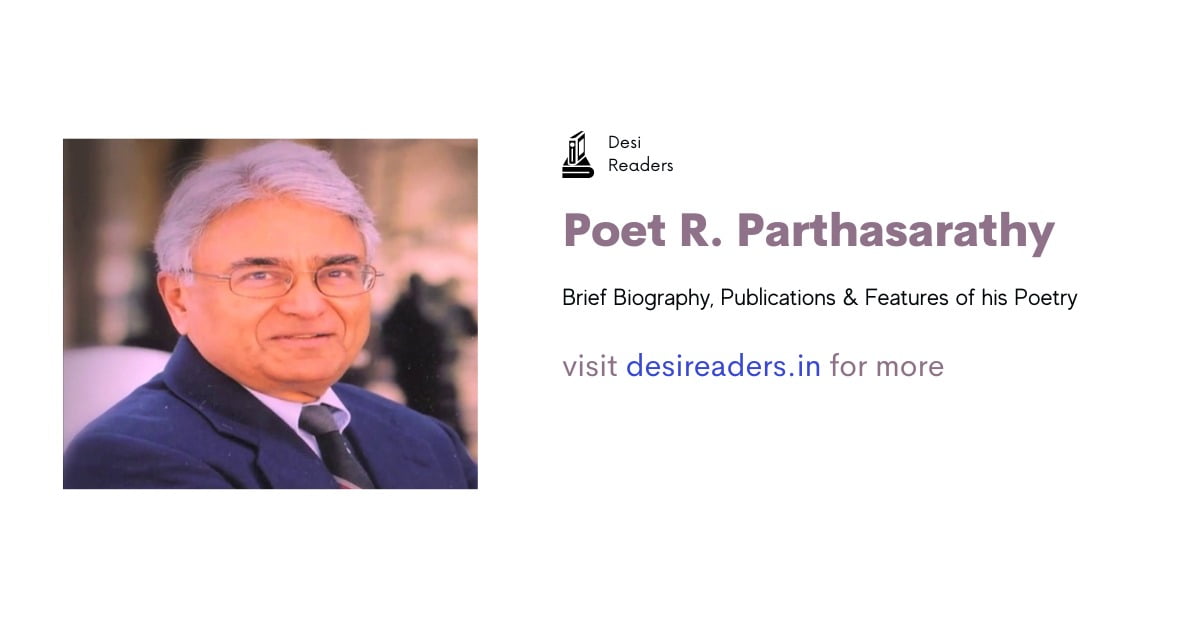R. Parthasarathy – an Indian English Poet treasuring Indianness in his Poetry
R. Parthasarathy: The Poet, Poetry, Indian Culture & Traditions, and Indianness in Indian English Poetry
R. Parthasarathy, a prominent figure in Indian English literature, is celebrated for his contributions as a poet, translator, and critic. His works resonate with themes of cultural identity, personal history, and the complexities of linguistic and cultural transitions. Through his poetry and translations, Parthasarathy has played a crucial role in enriching the discourse of Indianness in Indian English poetry. His exploration of Indian culture, tradition, and identity and his mastery of language have cemented his place as a significant literary figure in the postcolonial Indian context.

Brief Biography:
Rajagopal Parthasarathy was born in Chennai, India, in 1934. He pursued his early education in Tamil Nadu before moving to England for higher studies, where he developed a deep interest in English literature. Parthasarathy’s exposure to Western literary traditions, combined with his grounding in Indian cultural and linguistic heritage, influenced his later works. His career spanned various roles, including that of a professor, editor, and translator, contributing to his multifaceted understanding of literature.
Parthasarathy began his career as an editor for the Oxford University Press, where he was instrumental in shaping the course of Indian English literature. His editorial work provided a platform for Indian writers and poets, helping to elevate their voices in the global literary arena. He later served as a professor of English at Skidmore College in New York, where he continued to engage with literature through teaching and writing.
Publications and Literary Contributions:
Parthasarathy’s most significant work is his poetry collection Rough Passage, published in 1977. This collection is divided into three parts: Exile, Trial, and Homecoming, each reflecting a different phase of the poet’s life and his evolving sense of identity. Rough Passage is a semi-autobiographical work that explores themes of displacement, alienation, and the search for belonging. The poems in this collection are marked by a deep introspection and a keen awareness of the cultural and linguistic dichotomies that define the Indian postcolonial experience.
In addition to Rough Passage, Parthasarathy is widely recognised for his translation work, mainly his classical Tamil and Sanskrit literature translations. His translation of the ancient Tamil epic The Tale of an Anklet (translated as The Cilappatikaram of Ilango Atikal) is a monumental contribution to Indian literature. This translation brought the richness of Tamil classical literature to an English-speaking audience, preserving the epic’s poetic and cultural essence. Another notable work is Erotic Poems from Sanskrit, a collection that introduces readers to the erotic and sensuous world of classical Sanskrit poetry through modern English translations. This work reflects Parthasarathy’s ability to navigate complex cultural texts and present them in a way that resonates with contemporary readers.
Salient Features of Parthasarathy’s Poetry:
Parthasarathy’s poetry is characterised by its deep engagement with identity, culture, and language themes. His works often reflect a personal struggle with the complexities of postcolonial identity, where the poet grapples with the duality of being rooted in Indian tradition while being influenced by Western literary forms.
1. Exploration of Indianness
One of the most salient features of Parthasarathy’s poetry is his exploration of Indianness. His works often delve into the intricacies of Indian culture, history, and tradition, providing a nuanced portrayal of what it means to be Indian in a postcolonial world. In Rough Passage, for instance, the poet reflects on his experiences of living in England and the cultural dislocation he feels as an Indian in a foreign land. This sense of exile and alienation juxtaposes a longing for home and a deep connection to Indian cultural roots.
Parthasarathy’s exploration of Indianness is not limited to a nostalgic recollection of the past but is also a critical examination of the present. His poetry often questions the impact of colonialism on Indian society and the loss of cultural identity that accompanies modernisation and Westernisation. This critical stance is evident in his use of language, where he frequently shifts between English and Tamil, symbolising the linguistic and cultural tension many Indians experienced in the postcolonial era.
2. Linguistic Duality and Cultural Hybridity
Language plays a crucial role in Parthasarathy’s poetry, serving as a medium of expression and a symbol of cultural identity. His poems often reflect a linguistic duality, where the poet navigates between English and Tamil, reflecting the broader cultural hybridity that defines modern Indian identity. This linguistic tension is central to Parthasarathy’s exploration of self and identity, where language becomes a metaphor for the larger cultural and historical forces at play.
In Exile, the first section of Rough Passage, Parthasarathy grapples with his alienation in England, where English is both a communication tool and a reminder of his colonial past. The poet’s struggle with the English language symbolises his broader struggle with colonialism’s cultural imposition. However, this linguistic tension also serves as a means of self-discovery, where the poet’s return to Tamil in the latter sections of the collection represents a reclamation of his cultural identity.
3. Thematic Focus on Identity and Belonging
The themes of identity and belonging are central to Parthasarathy’s poetry. His works often explore the complexities of personal and cultural identity, particularly in the context of the Indian diaspora. In *Rough Passage*, the poet’s journey from exile to homecoming is a physical journey and a metaphorical exploration of his search for self and identity.
This thematic focus on identity is closely tied to the poet’s exploration of language and culture. Parthasarathy’s poetry reflects a deep awareness of identity’s fluid and dynamic nature, where the self constantly evolves and adapts to the changing cultural and linguistic landscape. This fluidity is evident in the poet’s use of imagery and symbolism, where the journey becomes a recurring motif, representing both the physical and metaphorical search for belonging.
4. Engagement with Classical Indian Literature
Parthasarathy’s engagement with classical Indian literature is another significant aspect of his poetry. His translations of Tamil and Sanskrit texts reflect his deep appreciation for India’s literary heritage and his commitment to preserving and promoting these ancient traditions. However, Parthasarathy’s engagement with classical literature is not limited to translation; it also informs his original poetry.
In works like Erotic Poems from the Sanskrit, Parthasarathy draws on the rich tradition of Sanskrit poetry to explore themes of love, devotion, and desire. These themes are not just literary tropes but are deeply embedded in Indian cultural and religious traditions. By bringing these ancient texts into conversation with modern English poetry, Parthasarathy creates a dialogue between the past and the present, highlighting the continuity and relevance of Indian cultural values.
Enriching the Discourse of Indianness:
Parthasarathy’s contributions to Indian English poetry are significant for their literary merit and for enriching the discourse of Indianness. Through his poetry and translations, Parthasarathy has sought to redefine what it means to be Indian in a globalised world. His works challenge the homogenising effects of colonialism and globalisation, advocating for a more nuanced and pluralistic understanding of Indian identity.
Parthasarathy enriches this discourse by foregrounding the multiplicity of Indian cultural and linguistic identities. His use of both English and Tamil in his poetry reflects the linguistic diversity of India and challenges the dominance of English as the sole medium of literary expression. By incorporating Tamil, Parthasarathy asserts his cultural identity and reclaims the linguistic heritage that was marginalised during colonial rule.
Furthermore, Parthasarathy’s exploration of Indian culture and tradition in his poetry offers a counter-narrative to the Western-centric perspectives that often dominate postcolonial literature. His works celebrate the richness of Indian cultural heritage, from the classical epics to the everyday experiences of Indian life. This celebration of Indianness is not uncritical. However, Parthasarathy also engages with the contradictions and challenges of modern Indian society, particularly in the context of globalisation and cultural change.
Conclusion:
R. Parthasarathy’s poetry is a testament to the enduring relevance of Indian cultural and literary traditions in the contemporary world. His exploration of themes such as identity, language, and belonging reflects the complexities of postcolonial Indian life, where the past and present are constantly in dialogue. Through his works, Parthasarathy has enriched the discourse of Indianness in Indian English poetry, offering a nuanced and multifaceted portrayal of Indian identity. His contributions as a poet, translator, and critic have left an indelible mark on Indian literature, making him a pivotal figure in the ongoing conversation about what it means to be Indian in a globalised world.
More articles featuring other Indian English poets, novelists, and authors are coming. We want to enrich our platform with write-ups prepared with an academic tone.
Ashish for Desi Readers
